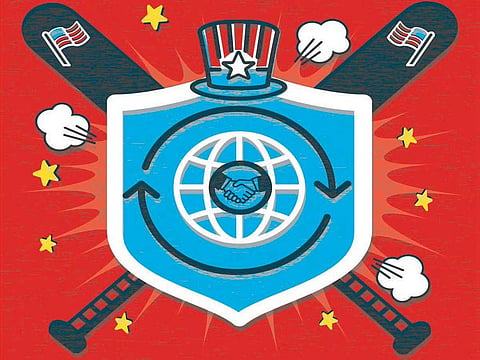Biden needs to urgently update US foreign policy
Incoming US administration will be faced with a lot of issues from around the world

US President-elect Joe Biden appears to be framing his foreign policy around three themes: re-engaging with America’s friends and allies, renewing US participation in international organisations and relying more heavily on nonmilitary instruments of power.
Considering the challenges posed by China and other countries, as well as transnational threats that range from pandemics to climate change, these are, in my view, the correct priorities. In each, it is necessary to reform, revitalise and restructure the American approach.
Our Nato allies, as well as Japan, South Korea and others, will welcome America’s reaffirmation of its security commitments and its switch to respectful dialogue. But the new administration ought to insist on our allies doing more on several fronts. President Trump’s pressure on them to spend more on defence was a continuation of a theme across multiple presidencies. That pressure must continue.
Turkey’s purchase of the Russian S-400 air defence system against repeated American warnings must have costs. nd Ankara must also be held to account for its actions in Libya, the eastern Mediterranean and Syria that contravene the interests of other Nato allies and complicate efforts to achieve peace.
Also Read: Biden will restore confidence in America
The United States needs to take the lead in Nato, an “alliance of democracies,” to devise consequences for member states — such as Turkey, Hungary and, increasingly, Poland — that move toward (or have fully embraced) authoritarianism.
Biden’s embrace of the international organisations that Trump has spurned must be accompanied by an agenda for their improvement. Despite their many problems, these organisations serve useful purposes and can be effective conduits for American influence around the world.
Closer to home, as the new administration commits to far greater reliance on nonmilitary tools like conventional diplomacy, development assistance and public diplomacy to protect America’s interests and advance our objectives, it needs to recognise that those tools overall are in serious need of investment and updating. Our national security apparatus — designed in 1947 — needs to be restructured for the 21st century.
Structural change
The State Department, America’s principal nondefense instrument of power, is in dire need of reform, as many senior active and retired foreign service officers attest. In return for meaningful structural and cultural change, the State Department should get the significant additional resources it needs.
In recent years, our international economic tools have centred mainly on punitive measures, such as sanctions and tariffs. We need to be more creative in finding positive economic inducements to persuade other countries to act — or not act — in accordance with our interests.
No other country comes even close to the United States in providing humanitarian assistance after disasters, but nearly all other major assistance successes in recent years — such as George W. Bush’s President’s Emergency Plan for Aids Relief or the creation of the Millennium Challenge Corporation — were put in place outside the normal bureaucratic structure or processes.
We should look for ways to leverage the power of our private sector. American corporations can partner with the United States government in countries around the world that offer both sound investment prospects and opportunities to advance American interests.
The creation in 2018 of the US International Development Finance Corporation was a good start. President Barack Obama’s 2013 “Power Africa” initiative, which was passed unanimously by both houses of Congress and aimed to bring universal electricity access to sub-Saharan Africa, is an example of successful partnering between the private sector and the government.
Finally, America’s strategic communications — our ability to spread our message and influence governments and peoples — are pitifully inadequate and outdated.
Recapturing primacy
In the early 2000s, President Hu Jintao of China committed some $7 billion to vastly expand China’s international media and influence capabilities. By way of contrast, in 1998, Congress abolished the US Information Agency; subsequently, “public diplomacy” was tucked into a corner of the State Department in an organisation that today doesn’t even report directly to the secretary of state.
There is no coordination of messaging across the government, and efforts to make better use of social media and other new technologies have been laggard and disjointed. Surely, the country that invented marketing, public relations and the internet can figure out how to recapture primacy in strategic communications.
Misgivings linger abroad about whether American re-engagement (and reliability) will last beyond this new administration — and about the new president’s views on the use of military power. That said, there is considerable relief among most of our allies that Biden has won the election.
This provides the new president with considerable leverage to revitalise and strengthen alliances and international institutions and to show at home that doing so advances American interests around the world and the well-being of our own citizens. This would be an enduring legacy for the Biden administration.
Robert M. Gates has served as the 22nd US Secretary of Defence (2006-2011)
The New York Times






